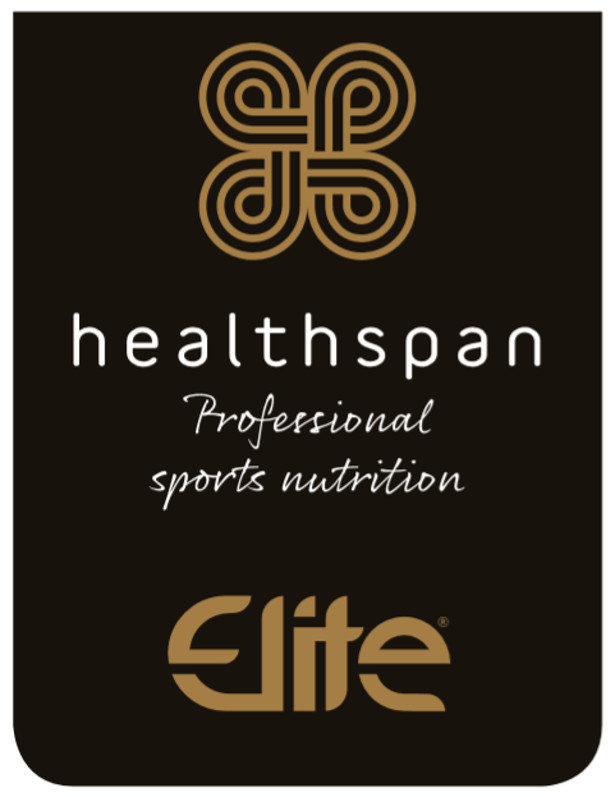Five essential things we need to know about collagen >> www.healthspan.co.uk/products/elite-collagen-repair

TWITTER | FACEBOOK | YOUTUBE | PINTEREST
Collagen is the most abundant protein in the body, it’s a required building block making it essential for athletes and people who do performance sport to maintain healthy connective tissue as a key component of their day-to-day lives.
This month, Healthspan Elite has launched a new product, Elite Collagen Repair, a premium combination of type I and type III hydrolysed collagen and vitamin C, in convenient orange flavoured daily servings. Batch tested and accredited by Informed Sport and in tamper evident daily sachets, these bioactive collagen peptides have been further separated in a second, controlled hydrolysation process for increased efficiency.

Hydrolysed collagen peptides have shown to be a nutrition solution to support strong and flexible tendons and ligaments in athletes, contributing to high performance and faster return-to-training from injuries.
Nigel Mitchell, Leading Performance Nutritionist and Elite Expert Panellist, says: “Over the last few years, oral collagen supplementation has become a part of the treatment and recovery for tendon sporting injuries. We use it routinely with the British Sailing Team.”
Type I collagen forms the most important building blocks in the body and a key structural protein in all connective tissues, such as skin, cartilage, tendons, ligaments, joints and bones. Type III is also present in tendons.
Where it comes from
Collagen is naturally produced in the body by fibroblasts, cells in connective tissues, and osteoblasts, cells that make bones. Type I, II and III make up 80 to 90 per cent of collagen in the body. Collagen supplements are generally made up of bovine or marine collagen.
Bovine collagen is a form of protein that’s mainly derived from cows. It’s associated with several health benefits including supporting join and skin health, and bone loss-prevention. It’s also used by fitness enthusiasts as a way to repair stressed muscles.
Marine collagen is sourced from fish scales and is rich in type I collagen which helps to rebuild your muscles, eyes, bones and spine. It’s also used in the beauty community for hair and nails.
Where it’s formed
The body makes its own collagen by breaking down dietary protein into amino acids, they are what build the various types of protein in the body, including collagen.
Why we need it and research
Injury recovery
Current research suggests that supplementing hydrolysed collagen and vitamin C will provide the amino acid building blocks that may promote greater collagen synthesis in connective tissue[i].
Wendy Martinson OBE, Lead Performance Nutritionist at the Intensive Rehabilitation Unit and SENr board member, explains: “Research done in 2019 shows that vitamin C acts as a co factor which means it’s required for the activity of the enzyme involved in the production of hydroxyproline which is one of the major proteins found in collagen.[ii] Another study reported decreased knee pain in athletes taking 10g collagen hydrolysate daily over 24 weeks.[iii]”
Bone collagen synthesis
Studies have looked at the effect of different preparations of collagen supplements on collagen synthesis rate in bone. Subjects took 15g vitamin C (48mg) enriched collagen either as a drink containing gelatin or hydrolysed collagen or as a gummy containing equal parts of both.[iv]
Martinson explains the study: “To load the musculoskeletal system and stimulate bone collagen synthesis subjects did 6 minutes of continuous jump rope 1 hour after consuming the supplement. After another 4 hours blood levels of Procollagen 1 N-terminal Propeptide (PINP) were measured. PINP is generally used as a marker of bone metabolism due to its high turnover rate and so was measured to represent bone collagen synthesis.”
“The results showed, firstly, the components of the collagen supplements were absorbed, as levels of glycine, lysine, proline, hydroxyproline and hydroxylycine were all elevated in the blood at the 1 hour time point after consumption.”
“Secondly, changes in the PINP levels suggested that collagen synthesis increased approximately 20% from baseline in the gelatin and hydrolysed collagen groups, but not in the gummy. Authors suggested this may be due to a lack of vitamin C which could have been deactivated due to heat exposure, or placebo group 4 hour after completing the 6 minute jump rope.”
Why diet matters
A good diet is crucial to provide the right balance of macro and micronutrients that the body needs to stay healthy and function normally. This is especially important for athletes undertaking a challenging training program. Martinson explains: “In athletes, given the amount of training they undertake each day, good nutrition and exercise are fundamental in maintaining healthy connective tissue.”
“If you have an injury or niggle in your joints or connective tissue then first of all make sure you are eating regularly with good sources of protein (including leucine rich sources), essential fats, vitamin C, zinc, copper and calcium to name a few of the key elements involved in healing and repair.”
“In addition to establishing a good meal pattern specific supplementation may be beneficial. There is growing evidence that combining specific loading exercise (make sure you get advice on this) with nutritional interventions including supplementing the diet with hydrolysed collagen or gelatin, both of which contains specific amino acids required for collagen synthesis, alongside vitamin C, may provide the stimulus to the cells of tendons or ligaments to increase collagen synthesis and promote healing.” [v],[vi]
Martinson concludes: “The addition of an appropriately timed collagen or gelatin supplement may play a beneficial role in the nutrition strategy supporting athletes recovering from joint or connective tissue injuries.”
[1] Heaton, L., E et al. (2017) Selected in-season nutritional strategies to enhance recovery for team sport athletes: a practical overview. Sports Medicine, 47, 2201-2218.
2 Close, G et al. (2018) Nutrition for the prevention and treatment of injuries in track and field athletes. International Journal of Sport Nutrition and Exercise Metabolism, 29, 2, 187-197.
3 Clark, K. et al., (2008). 24-week study on the use of collagen hydrolysate as a dietary supplement in athletes with activity-related joint pain. Current Medical Research and Opinion, 24: 1485 – 1496.
4 Lis, D., M., Baar, K. (2019) Effects of different vitamin C -enriched collagen derivatives on collagen synthesis. International Journal of Sport Nutrition and Exercise Metabolism, 29, 526-531.
5 Shaw, G.et al. (2017). Vitamin-C enriched gelatin supplementation before intermittent activity augments collagen synthesis.American Journal of Clinical Nutrition, 105: 136-143.
6 Shaw, G. et al (2019). Rehabilitation and nutrition protocols for optimising return to play from traditional ACL reconstruction in elite rugby union players: A case study. Journal of Sports Sciences, 7(15):1794-1803.






